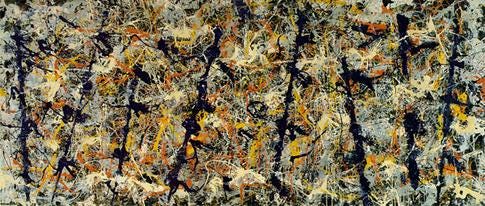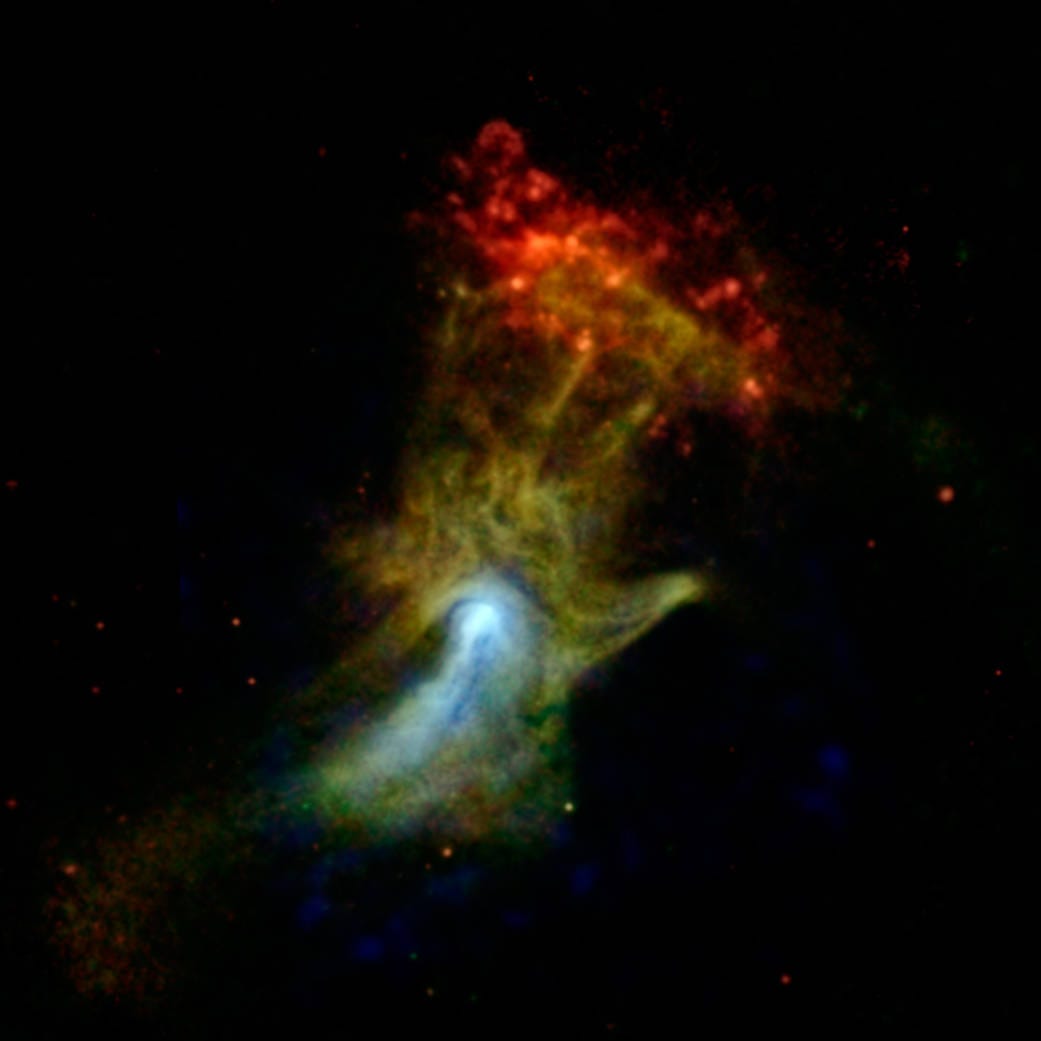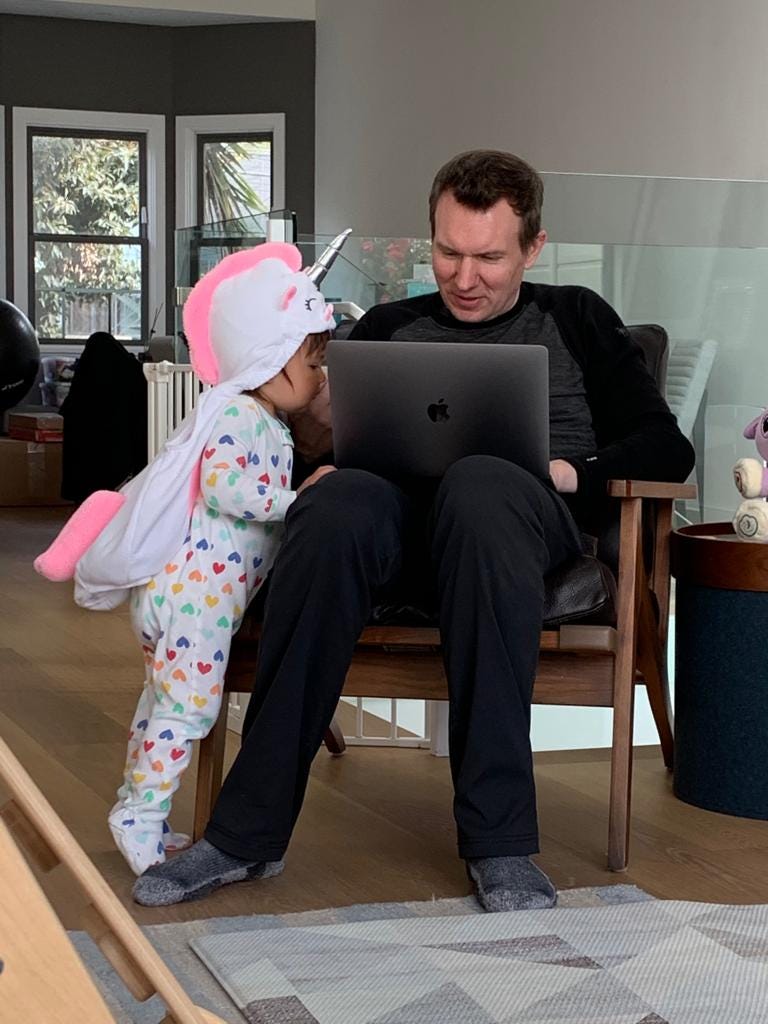"Am I an LLM?"
In search of ‘Interesting Quotes’
One of the most meaningful classes I took in college was Drawing I, taught by a painter named Kevin Bean. It was my senior year, and the only reason I was in the class was to fulfill a requirement for my studio art major. In the second to last class, Kevin passed out seven pages simply titled “INTERESTING QUOTES.”
I remember quickly reading over them and finding a few that strongly resonated with me:
Imagination is more important than knowledge. -Albert Einstein
I am nature. -Jackson Pollock (to Hans Hoffman, who accused Pollock of not painting from nature)
The universe is not only stranger than we imagine, but it is stranger than we can imagine. -J.B.S. Haldane
People say that what we are seeking is a meaning for life. I don't think that's what we're really seeking. I think that what we're seeking is an experience of being alive, so that our life experiences on the purely physical plane will have resonances within our own innermost being and reality, so that we actually feel the rapture of being alive. -Joseph Campbell
In the next class, we were running short on time, but before we disbanded for the final time, Kevin asked if any of the quotes had resonated with us. My hand immediately shot up, and I shared one of the quotes. Kevin said something affirming and asked if there were any others. No one else said anything, so I shared another. And then another. It was surprising to me that other people hadn’t connected with them the same way I did.
Last week, twenty years later, I found myself frustrated that I couldn’t find this collection of quotes. I knew I wouldn’t have intentionally thrown it away, but I couldn’t find it anywhere. I was looking for the origin of the quote:
Reality is whatever you can get enough people to agree on.
This quote came to mind as I was thinking about AI and listening to a talk by Yuval Noah Harari called AI and the future of humanity. In it, he talks about how large language models have hacked the human “operating system” – our language. In a world where AI has mastered language and becomes more persuasive than any person, AI can control us, not through robots carrying guns, but through the way it interacts with us one-on-one. In effect, AI becomes the super-salesperson who can convince us to buy anything and we aren’t even sure why.
We don’t need fancy spatial computing goggles to redefine reality if we can just convince enough people that what we’re saying is right. As provocative an idea as this is, it isn’t new, and isn’t unique to AI. What’s going on when a charismatic cult leader brainwashes their followers? Who thinks that advertising doesn’t work on them, even when it’s been shown time and time again to change behavior? Who’s really in control when someone is mindlessly scrolling through a news feed that has been optimized to deliver more revenue? As much as we like to think of ourselves as masters of our actions, it’s often unclear if the system is working for us or the other way around.
No technology other than language is required to raise these questions. The power and danger of language is that it enables learning without direct experience. I can be told to avoid the grassy hill where the wolves like to roam, and not have to experience the pain of discovering that myself. But what happens if the real reason I was told to avoid that hill isn’t that there are wolves, but rather an abundance of food that someone else wants to hoard?
This new generation of AI will surely have a broad societal impact. Imagine you’re a kid who has always been good at math. Over time this becomes a big part of your identity: I may not be good at those other things, but I know I can add numbers faster than anyone else. And furthermore, I know this skill is in demand and useful. Then all of a sudden, the digital calculator shows up and can add faster and more cheaply than any person. How does your conception of who you are change?
The same thing is likely to happen for many jobs that we think of as being complex and difficult to learn. Practicing law, developing software, and many forms of writing all require intense, prolonged study, and are changing dramatically as a result of large language models.
Maybe a lot of our uses of language – even some of the ones that feel complicated – are more like math, and these LLM’s are like calculators for language that automate away work that isn’t as human as it first appears. If we think about the things that a language calculator is good at as being far from what makes us uniquely human, it could help us reason about what’s at the heart of the human experience.
Please, take my job!
I have a strange genetic deficiency where I hate having a boss and love finding ways of working myself out of jobs. AI is capable of taking my job? Please, sign me up! If AI can do a better job, I want it to take my job, just the way I want someone I hire to be better than I am at whatever we’re trying to achieve. That frees me up to focus on something else.
I’ve adopted this mindset using ChatGPT to write code. If ChatGPT could be an engineer that is always at the ready, willing to implement whatever wild idea I’ve come up with, I’d love it. I’ve tried a variety of strategies to see how far I can push this.
One approach is to adopt the persona of someone who doesn’t know how to write code. I describe what I want to ChatGPT, ask it to write the code and show me how to run it, and evaluate how closely it achieved the result. If there are issues, I ask it to fix it.
Another approach is to pair-program with it. Basically, I treat it as my partner, and share code I’ve written myself, ask it to fix issues with my code, ask it to show me how to do something new, and share improvements I’ve made to code it’s written.
For simple tasks, it does surprisingly well. For instance, I asked it to write a Python script that watches a folder on the Mac file system and runs some code anytime a file is copied or removed from the folder. I would have had to wade through a bunch of documentation that isn’t very well written (or at least isn’t very specific to the task at hand) to learn how to do this. Instead, ChatGPT gave me a piece of example code that mostly worked and was a great starting off point for me to extend. For anything that hasn’t changed in the past couple of years, ChatGPT has replaced technical documentation for me. It works so much better and makes me so much more efficient.
At the same time, none of the code that ChatGPT has generated has worked off the bat for me. Zero. Some of it has the equivalent of small typos that prevent it from working but are also easy to fix. Other times, it generates code that has subtle issues, like off by one errors. In these cases, I feel more like I’m debugging the code written by an intern. These errors are especially problematic when the person using the code doesn’t understand what has been generated. Finally, there is another class of issues where it gets itself into a downward spiral, especially if I ask it to help fix the error. I’ve seen it hallucinate libraries that don’t exist, add a lot of complexity to code that is unnecessary and makes it hard to follow, or cheerfully and confidently say that it has fixed all the issues when in fact the code won’t run. Asking it to help fix any of these issues just makes it worse.
Nevertheless, I love getting ChatGPT to write code, and I wouldn’t want to give it up. It helps me learn things faster. Sometimes I have an off-the-wall idea that I would never spend the time to implement. Now I can just try it out with ChatGPT. Worst case, it chokes on it and I move on. (e.g. “How would you write an FTP server that runs on AWS Lambda?” It didn’t like this idea. I was using this prompt to see if it could come up with a new approach to a technical problem that wasn’t based on an existing example. Instead, it preferred to tell me why this was a bad idea, rather than actually working the problem as described. What a pseudo-human response to being asked to do something new!)
One advantage of writing code with ChatGPT is that code can be validated relatively easily. If I ask ChatGPT to give me a summary of the history of the Civil War, it’s challenging to quickly assess if that answer is accurate or not. On the other hand, if I ask it to write code, I can run it and try it out. Does it work? Plus, I’m pretty good at testing code other people have written, so I can usually size up if it’s on the right track or not (not that this is always an enjoyable activity).
In the end, I failed to work myself out of this particular job, but I did find a partner in coding that makes me faster and helps me find new paths when I feel stuck.
Analog Obscura
The other day, I woke up frustrated with all this AI stuff. The arguments about how it could lead to the extinction of humans were bouncing around in my head at the same time I couldn’t get what seemed like a simple piece of code to run, and ChatGPT was no help at all. What is the point of all of this? I needed a break and yearned for something more analog.
I decided to turn the room I was working in into a camera obscura. I’ve always been fascinated by the camera obscura, which projects an image of the outside world into a darkened room. The physical properties at play have been known for hundreds of years, but I’ve never built one before and decided today was the day to try.
In theory, it’s a simple process. You need to get the room as dark as possible, and then make a small hole that lets light in from the outside. If you want to get fancy, you can use a lens to sharpen the image. If all goes well, an image of the outside will be projected upside down on the wall opposite the opening the light comes in.
The hardest part was getting the room dark. Once it was dark enough, a faint image of the outside world magically splashed across the ceiling. I sat there in the dark, quietly watching the outside world move around me. It felt like being immersed in Plato’s cave, but in high-definition.
I felt a calm come over me. It was a much more visceral experience than I expected. In seeking a connection to the analog physical, I didn’t feel more grounded. I felt at peace with the sense that everything is an illusion of one form or another.
I thought about the blur that is my memory of life and how little I am aware of everything I experience in a day. I thought about the possibility of living in a simulation, just as the world I was witnessing in the camera obscura could feel as real as the outside world if it was all I knew. I thought about the question of whether LLM’s are more like statistical parlor tricks or the advent of a new superintelligence. I had no answers, but in that moment, I did feel connected to the mystery of the universe. I didn’t realize this at the beginning, but that was the feeling I was seeking.
“Interesting Quotes” found?
The next day, I removed all the cardboard used to darken the room and finally managed to locate “INTERESTING QUOTES” from Kevin Bean. I immediately scanned it and searched for the origin of “Reality is whatever you can get enough people to agree on.”
It turns out, this quote is nowhere to be found in this collection. The quote I was likely remembering is: “Reality is nothing but a collective hunch.” – Lily Tomlin. My quote was my own hallucination. For a fleeting moment, I asked myself, “Am I an LLM?” Ha! Unlikely – my breadth of knowledge isn’t nearly broad enough.

Rereading these pages of quotes, I was struck by how many of them took on a new significance in light of the questions raised by LLM’s. Jackson Pollock’s “I am nature” feels like a declaration of being human, an experience an LLM can never know. Joseph Campbell’s quote about “what we're seeking is an experience of being alive” also resonates more deeply, as if it is trying to get at the essence of being human.
Perhaps we are witnessing the advent of a superintelligence that can score better than humans on most tests and is a calculator of language that can be leveraged in many ways both good and bad. Yet, scoring well on a test has never been a particularly significant human accomplishment, compared with things like writing a song that deeply connects with other people, feeling love for another person, experiencing the joy of creating something for the first time, or working through the pain of loss.
There is no doubt that sharing our universe with a super-intelligent test taker poses serious risks that are important to identify and address. On the other hand, the most commonly described positive contrast to this doomsday scenario isn’t a future where more people feel more alive. It is the idea of the super-human scientist. The machine that will cure cancer and solve global warming. It is a fantasy that we can offload responsibility for the problems that we’re facing to a “more-intelligent” being. Is this “positive” scenario just a collective wish that someone else will step in and solve all our problems for us, the way a child might expect a parent to?

Both of these scenarios are about humans abdicating control. In the first scenario the machines that we created take over on their own accord because we fail to contain them. In the second, we want the machines to take over to solve the problems we can’t. I’ve even felt this on a micro-level hoping that ChatGPT can fix code that I certainly could fix on my own. Is the best we can hope for a kind of “benevolent dictator” AI?
The future almost certainly holds elements of both of these scenarios, but I also hope there is room for a third path that is about humans gaining greater agency. I’d love to live in a world where more people have the opportunity to be in touch with that most uniquely human feeling that Joseph Campbell describes as the “rapture of being alive.” It is possible to imagine a world where AI could help enable this for many more people, and I wish as much energy was going into this objective as building bigger models. In this respect, I am with Einstein. “Imagination is more important than knowledge.”








Your description of your camera obscura experiment was fantastic, mesmerizing.
I love how AdrianChat2Self created a quote you were looking for--that did not exist on the list you were looking for and eventually found.